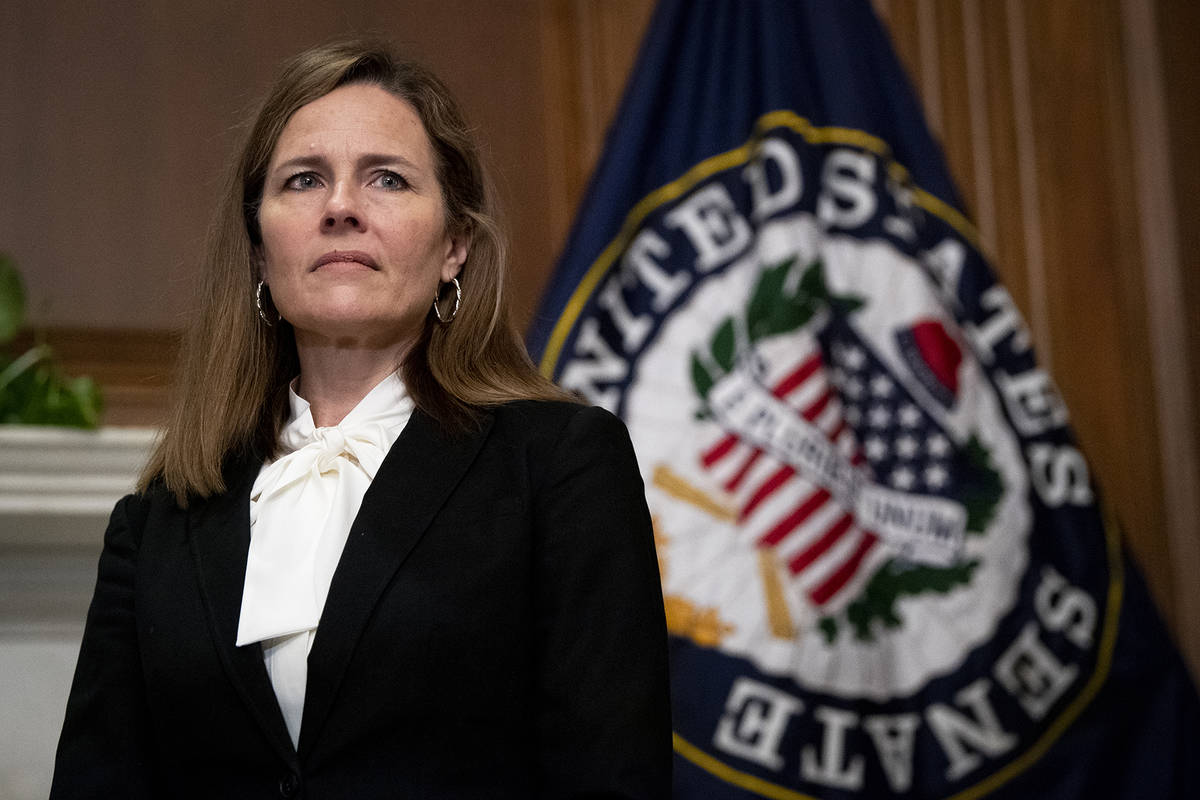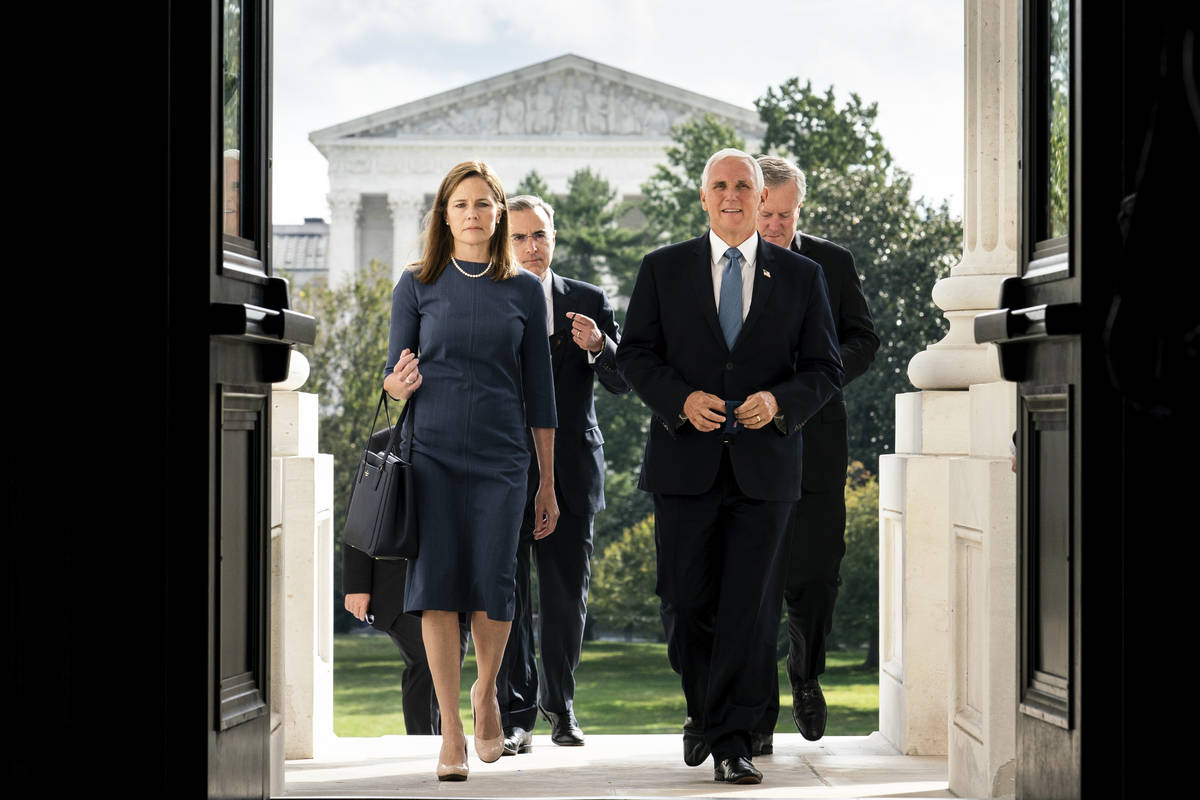Barrett faces confirmation gauntlet in Capitol shuttered by coronavirus
WASHINGTON — A hyper-charged atmosphere of political division awaits Judge Amy Coney Barrett this week when Senate hearings begin on her nomination to the U.S. Supreme Court.
But COVID-19 and the looming general election ensure this will be a confirmation process like none before.
The hostile environment was created decades ago when Democrats rejected conservative Judge Robert Bork for a spot on the high court and then battered Clarence Thomas, another conservative, before ultimately confirming him. Republicans delivered a measure of payback when senators ignored the 2016 nomination of Judge Merrick Garland, denying President Barack Obama’s pick an election-year hearing and vote.
It exploded again two years ago, when Democrats rallied behind eleventh-hour charges of sexual assault, stemming from encounters that allegedly occurred decades ago, against conservative Judge Brett Kavanaugh, President Donald Trump’s nominee to replace retiring swing Justice Anthony Kennedy. The scorched-earth political firestorm delayed a committee vote, sparked protests, prompted angry confrontations between protesters and GOP senators and infuriated Republicans.
Kavanaugh was confirmed, and the table is set for another combustible hearing as Republicans rush to replace the late Justice Ruth Bader Ginsburg before the Nov. 3 election.
With an election weeks away, Barrett, a mother of seven who went through the confirmation process in 2017 when she was appointed to the 7th U.S. Circuit Court of Appeals, will appear before the panel during a week when the full Senate is out of town and some committee members could participate virtually.
A vote is less than a month away, but Republicans have the 51 needed to confirm Barrett, leaving the Democrats little hope of blocking the nomination.
Nonetheless, Democrats are deploying tactics to delay the vote until after the election with hopes of capturing a Senate majority, the White House and the ability to confirm a nominee of Joe Biden’s choosing.
High-stakes fight
The stakes are evident to everyone.
“I have asked Mitch McConnell not to delay but to instead focus full time on approving my outstanding nominee to the United Supreme Court, Amy Coney Barrett,” Trump wrote on Twitter.
Democrats are wasting no time trying to paint Barrett as an out-of-the-mainstream jurist and the wrong person to fill the vacancy created by the death of Ginsburg, a liberal icon and advocate for women’s reproductive rights and equality.
Judiciary Committee Democrats pored over Barrett’s filings and questioned the absence of a 2006 newspaper advertisement she signed with other pro-life leaders that opposed “abortion on demand” and called for overturning the landmark 1973 Supreme Court ruling Roe v. Wade.
Democrats contend the ad raises questions about Barrett’s neutrality, and its omission from her papers demonstrates hearings are being rushed. Republicans have all but brushed aside Democratic arguments and have praised Barrett for her intellect and judicial temperament.
“She’s a judge, legal scholar, lawyer and a jurist with outstanding credentials,” Sen. Mike Lee, R-Utah, said after his meeting with Barrett on Capitol Hill.
Ad war over nomination
Although the process is expedited, the parties in the pitched battle will be bolstered by television advertisements funded by dark money from political action committees that steer funds from secret donors to ideological causes.
Those groups have raised record-breaking amounts of money for campaigns for and against Barrett’s nomination, according to the Center for Responsive Politics, a nonpartisan watchdog that tracks money in politics.
The Judicial Crisis Network, a conservative group, has raised $16 million, and President Carrie Severino told CNBC that her organization would outspend the $10 million pledged by its liberal counterpart, Demand Justice.
Protests are expected on the Capitol grounds and outside the Supreme Court. But unlike the Kavanaugh hearings, Senate office buildings will be closed to the public during the Barrett hearings because of the coronavirus pandemic, and the full Senate is in recess until later this month. The viral videos of activists following and screaming in the faces of Republican senators in hallways will be missing from social media and cable news this time around, and protesters won’t be able to disrupt the committee hearings, as they did with Kavanaugh.
Committees will still operate, and Judiciary Chairman Lindsey Graham, R-S.C., has set the confirmation hearing for Monday through Thursday, with the potential for a Friday meeting if needed.
Graham said Barrett is an extremely qualified nominee and will be treated accordingly.
“I’m very committed to ensuring that the nominee gets a challenging, fair and respectful hearing,” Graham said.
‘Through the wringer’
Expect Barrett to receive a thorough grilling by Democrats, praise from Republicans and possibly a few surprises.
“She’s already been through the wringer once. I think she will be prepared. She’s articulate. I expect she will do well,” said Carl Tobias, a law professor at the University of Richmond and former founding faculty member at the Boyd Law School at UNLV.
In her nomination hearing for the 7th Circuit, Sen. Dianne Feinstein, D-Calif., questioned Barrett’s Catholic faith and its influence on judicial decisions.
“The dogma lives loudly within you, and that’s a concern,” said Feinstein, the ranking Democrat on the committee.
The comment prompted a backlash against Feinstein, and it’s unlikely that Democrats will follow that tack in the upcoming hearing, Tobias said, although a delicate questioning of her faith and its influence on judicial decisions is likely.
The pro-life Susan B. Anthony List has called on Biden and vice presidential nominee Sen. Kamala Harris, D-Calif., a member of the committee, to denounce pending attacks on Barrett’s Catholic faith.
But Barrett handled the Democratic questioning with aplomb, and her experience will serve her well as she heads back to joust with lawmakers over decisions that were made on the circuit bench, GOP lawmakers said.
Democrats face a dilemma.
“There is an election coming up. Do they want to look like they are beating up on her?” Tobias asked of the Democrats’ strategy.
“It’s harder to ask difficult questions here, to really grill her the way you could grill the other two nominees that Trump appointed,” Tobias said, referring to Kavanaugh and Justice Neil Gorsuch.
Instead, Democrats are focused on her record and statements regarding reproductive rights, and her writing on issues surrounding the Affordable Care Act, commonly known as Obamacare. The Supreme Court next month will hear a case brought by states seeking to abolish the ACA.
Nevadans opposed
Sen. Catherine Cortez Masto, D-Nev., who is not a member of the Judiciary Committee, said she would raise her concerns about Barrett with Nevadans.
Cortez Masto, and Sen. Jacky Rosen, D-Nev., have announced they will oppose the nomination if a vote is held.
Democrats also argue that the next president should pick the nominee.
American public opinion is with them, as well as two Republicans, Sen. Lisa Murkowski of Alaska and Susan Collins of Maine, both of whom have said they will not vote on confirmation before the election.
A New York Times/Siena College poll released Sept. 27 found that 56 percent of likely voters said the election should serve as a referendum to fill the seat, while 41 percent preferred that Trump fill the vacancy before the election.
The poll had a margin of error of plus or minus 3.5 percentage points.
In the aftermath of Ginsburg’s Sept. 18 death, the court is split 5-3 with Republican nominees in the majority. Appointing a sixth Republican-nominated justice would tip the court toward being the most conservative bench in history, Tobias said.
Expanding the court
Some liberal senators, like Ed Markey, D-Mass., said that if Republicans in the Senate push through a replacement for Ginsburg, Democrats could expand the court’s numbers, assuming they win the White House, keep the House and take back the Senate in the November election. They could fill the new seats with left-leaning jurists in a process known as “court packing.”
Biden and Harris have ducked the question of whether they support expanding the court in recent debates, and Biden told reporters recently that he would declare his position on Supreme Court expansion after the election. Is the idea really on the table, or is the silence of Biden and Harris just a nod to the party’s liberal base as the election nears?
Biden, a former chairman of the Senate Judiciary Committee who oversaw the confirmation of Justice Clarence Thomas, has disavowed the idea in the past.
The process might require changing Senate rules to eliminate the filibuster for legislation, something both parties have been loath to do.
Counting the votes
Meanwhile, Republicans have their own concerns.
Two GOP members of the Judiciary Committee, Lee of Utah and Thom Tillis of North Carolina, are among three senators who tested positive for COVID-19 after a Rose Garden ceremony held by Trump to announce Barrett’s nomination.
Graham has said the confirmation hearings would allow all members to participate in person or virtually. The committee must send the nomination to the full Senate for consideration, whether the committee decides to endorse her for the post or not.
Although rule changes in the committee could allow senators to vote remotely, Senate rules require every lawmaker to cast a vote in person on the floor.
Republicans hold a 53-47 majority in the Senate. With Murkowski and Collins having pledged not to vote on the nomination before the election, the majority is at a slim 51 votes.
The GOP could only afford to lose one more vote to confirm the nominee before the election, assuming Vice President Mike Pence casts the tie-breaking vote. Otherwise, the Senate could be forced to delay the final decision until after the election in a lame-duck session.
Tillis, who is recuperating from COVID-19 at home, said he expects to participate in some of the hearings remotely but to cast a vote in committee and during the roll call for confirmation by the full Senate.
“I should be cleared for the vote later this week,” Tillis told Fox News.
Sen. Ron Johnson, R-Wis., who is not on the committee, also is recovering from a coronavirus diagnosis, leaving three Republican senators sidelined as the majority eyes a vote in late October.
Although McConnell does not plan to have a vote on the nomination until later this month, parliamentary maneuvers could force a final decision to come after the election — when outgoing lawmakers are no longer restrained by party leaders or the need to stand for election.
^
Contact Gary Martin at gmartin@reviewjournal.com or 202-662-7390. Follow @garymartindc on Twitter.
























